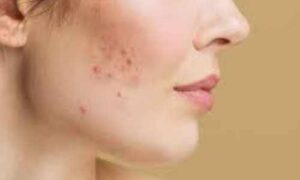PREMATURE GRAYING OF HAIR - AN OVERVIEW
Hair plays an important role in one’s physical appearance. Hair graying is an age related process. Premature graying (PHG) or premature canitiesis a process of earlyaging and occurs regardless of gender or race.
Our hair is connected to small sac is called hair follicle which contain pigment is named asmelanin, decreased melanin production which results inloss of hair colour. In this condition when a person’s hair starts graying (discoloration) in early 20s in white, 25 in Asians and 30 in Africans.
In men graying usually starts at the sideburns and the temples and later on spread to the whole scalp, whereas in women it starts at the perimeter of the hairline.
SYMPTOMS OF PREMATURE GRAYING
Premature graying of hair typically manifests as the appearance of gray or white hair at an earlier age than expected based on genetic and ethnic factors. While graying itself is a visual symptom, there are no specific physical discomforts associated with the process. However, there might be underlying factors or conditions that could contribute to premature graying. Here are some signs and considerations:
Appearance of Gray or White Hair:
The most obvious symptom is the premature change in hair color, usually before the age of twenty in Caucasians and before thirty in African-Americans.
Rapid Onset:
The graying process may occur rapidly over a short period rather than gradually.
Nutritional Deficiencies:
Premature graying could be associated with deficiencies in certain vitamins and minerals, such as vitamin B12, iron, copper, and zinc.
Thyroid Disorders:
Conditions affecting the thyroid gland, such as hyperthyroidism or hypothyroidism, might contribute to premature graying.
Vitamin D Deficiency:
Insufficient levels of vitamin D have been linked to premature graying.
CAUSES OF PREMATURE GRAYING
The main reason for premature graying is genetic. Other factors responsible are:
- Stressful lifestyle,
- lack of sleep,
- Anxiety,
- Anger,
- Excessive consumption of alcohol or caffeine,
- Excessive consumption of spicy or greasy food,
- Irregular diet habits,
- Long-term use of harsh shampoo or hair gel or hair colour or even hair dryer,
- Continuous exposure to sun (UV radiation),
- Smoking.
- Beside these people suffering from anaemia, hypothyroidism, cystic fibrosis and HIV are more prone to premature graying.
PREVENTION OF PREMATURE GRAYING
Preventing premature graying involves adopting a healthy lifestyle, maintaining proper nutrition, and practicing good hair care. While complete prevention may not be possible for everyone, as some degree of graying is a natural part of the aging process. However, the following lifestyle practices can contribute to overall hair health and potentially delay the onset of premature graying:
Balanced Diet:
Ensure a well-balanced diet rich in vitamins and minerals, focusing on foods like fruits, vegetables, lean proteins, and whole grains.
Antioxidant-Rich Foods:
Consume foods high in antioxidants, such as berries, green leafy vegetables, nuts, and seeds, to combat oxidative stress.
Adequate Hydration:
Stay well-hydrated by drinking plenty of water to support overall body and hair health.
Manage Stress:
Practice stress-reducing activities like meditation, yoga, or deep breathing exercises, as chronic stress can contribute to premature graying.
Quit Smoking:
Quit smoking, as it has been linked to premature graying and offers various health benefits.
Protect Hair from Environmental Damage:
Limit exposure to pollutants and harsh chemicals, using protective measures like hats when necessary.
Good Hair Care Practices:
Choose mild, sulfate-free hair care products suitable for your hair type and minimize the use of heat styling tools.
Regular Scalp Massage:
Stimulate blood flow to the hair follicles through regular scalp massages to promote hair health.
Avoid Overprocessing:
Minimize the use of hair dyes and chemical treatments, as excessive use of harsh chemicals can damage hair.
Consult a Professional:
If you notice signs of premature graying, seek advice from a dermatologist or healthcare professional to identify any underlying health issues and receive appropriate guidance.
DIAGNOSIS OF PREMATURE GRAYING
Premature graying, also known as premature canities, refers to the early onset of gray or white hair before the age of twenty in Caucasians or before thirty in African-Americans. While it is a common phenomenon, the exact cause of premature graying is not always clear, and it can be influenced by a combination of genetic, environmental, and lifestyle factors. Here are some potential causes and considerations:
Genetics:
Premature graying often has a genetic component. If your parents or grandparents experienced early graying, you may be more likely to as well.
Nutritional Deficiencies:
Deficiencies in certain vitamins and minerals, such as vitamin B12, iron, copper, and zinc, can contribute to premature graying. Ensure a balanced diet to meet your nutritional needs.
Oxidative Stress:
Oxidative stress occurs when there is an imbalance between antioxidants and free radicals in the body. It is believed that oxidative stress can contribute to premature graying. Antioxidant-rich foods and a healthy lifestyle may help counteract this.
Hormonal Changes:
Hormonal changes, such as those during puberty or menopause, may play a role in premature graying.
Autoimmune Conditions:
Certain autoimmune conditions, like vitiligo or alopecia areata, may be associated with premature graying.
Smoking and Environmental Factors:
Smoking has been linked to premature graying, and exposure to environmental pollutants may also contribute.
Stress:
While stress’s direct impact on graying is not entirely clear, chronic stress is associated with various health issues that could potentially contribute.
Medical Conditions:
Some medical conditions, such as thyroid disorders or pernicious anemia, can cause premature graying.
ALLOPATHY APPROACH TOWARDS PREMATURE GRAYING TREATMENT
Allopathic treatments for hair fall often involve medications aimed at addressing hormonal imbalances, nutritional supplements to correct deficiencies, and topical solutions to stimulate hair growth. Prescription medications such as minoxidil and finasteride may be recommended based on the severity of the condition.
AYURVEDA APPROACH TOWARDS PREMATURE GRAYING TREATMENT
Premature graying is also known as Akalapalitya in Ayurveda. It is categorised under kshudraroga and is also known as rasapradoshajvyadhi.
Vata, pitta and kapharegulates all the activities of the body. Vitiation of pitta is carried by vatadosha and lodging to kapha in hair follicle leading to premature graying of hairs. It is further classified on the basis of doshik – vataj, pittaj, kaphaj, dwandwaj and tridoshaja.
Premature graying can also be treated with the application of organic dye, which is a combination of different medicinal plants. Some of the plants used in treating Premature graying of hair are:-
Emblicaofficinalis(amla), Phyllanthusemblica, Azadirachtaindica (neem), Rhodiolarosea, Daucuscarota (carrot), Prunusdulcis (Almond).
ROLE OF PANCHKARMA IN PREMATURE GRAYING TREATMENT
Nasya karma (administration of medicine through nostrils) is one of the major treatment protocols for treating premature graying. There are many oil preparations used for nasyakarma in treating premature graying, some of them are -Prapaundrakadi tel, Ma-hanil tel, Yashtimadhvadi tel, Chandanadya tel Sahacharadi tel etc.
Shirobhyanga (oil massage) also helps to prevent graying of hair. Some oils used in treating this are Bhringraj Oil, or Neeli Oil. If graying is dueto stress then yoga and pranayama helps in treating it.
PREMATURE GRAYING TREATMENT AT DR MONGA MEDI CLINIC
If you’re grappling with hair fall issues or have been diagnosed with any related conditions, we encourage you to reach out to Dr. Monga Clinic for specialized care. Book a consultation with our expert team dedicated to providing personalized attention and effective treatment options. We are committed to helping you regain control of your hair health and live confidently. Take the first step toward healthier hair by contacting us today.
Expert Diagnosis: Our clinic initiates your journey to combat hair fall with a comprehensive assessment of your symptoms. Our experienced Doctors will carefully review your medical history and conduct relevant tests to accurately diagnose the underlying causes of your hair fall. These assessments may involve blood tests to measure essential hormone levels, ultrasound imaging of the scalp, or other diagnostic procedures to identify contributing factors.
Customized Treatment Plan: Once we understand the nature and extent of your hair fall concerns, our team will craft an individualized treatment plan tailored to your specific needs. Our approach integrates medical expertise, advanced technology, and patient-centered care. Depending on the severity of your condition, our treatment plans may encompass medications, lifestyle adjustments, dietary recommendations, or targeted therapies.
Lifestyle Modifications: In conjunction with prescribed medications, we underscore the importance of lifestyle changes to support optimal hair health. Our team will guide you on maintaining a well-balanced diet, incorporating foods rich in vital nutrients like biotin, iron, and vitamins crucial for healthy hair growth. Stress reduction strategies, regular exercise, and sufficient sleep are also emphasized to foster overall well-being and promote hair health.
Continuous Support and Follow-up: At Dr. Monga Clinic, we prioritize building enduring relationships with our patients. Throughout your hair restoration journey, our team provides ongoing support and guidance. Regular check-ups are scheduled to monitor your progress, make adjustments to treatment plans as needed, and address any concerns you may have. Your well-being is our foremost concern, and we’re dedicated to assisting you at every stage of your recovery.
FREQUENTLY ASKED QUESTIONS
Graying is considered premature if it occurs before the age of 20
If you’re concerned about premature graying, especially if it’s happening rapidly or if there are other accompanying symptoms, it’s advisable to consult with a healthcare professional or dermatologist. They can help assess your overall health and provide guidance based on your specific situation.
Premature graying is not necessarily a direct sign of other health conditions, but it can be associated with certain conditions like thyroid disorders or autoimmune diseases.
Foods rich in antioxidants, vitamins (especially B vitamins), and minerals like iron and zinc can support overall hair health. Including a variety of fruits, vegetables, lean proteins, and whole grains in your diet may be beneficial.
In general, once hair has turned gray, it cannot be reversed to its original color. However, addressing underlying health issues, adopting a healthy lifestyle, and proper hair care may help slow down or manage premature graying.
INFORMATIVE ARTICLES ON HAIR AND SKIN PROBLEMS

Acne and Pimples
ACNE AND PIMPLES – AN OVERVIEW Acne and pimples, two dreaded words for anyone who has ever dealt with them. These pesky little bumps can appear

Skin Allergies
SKIN ALLERGIES – AN OVERVIEW Skin allergies, or allergic dermatitis, result from exposure to allergens like foods, plants, metals, or medications. Symptoms include redness, itching,

Dandruff
DANDRUFF – AN OVERVIEW Dandruff is a common scalp condition characterized by the presence of small, white flakes of dead skin that often appear in












